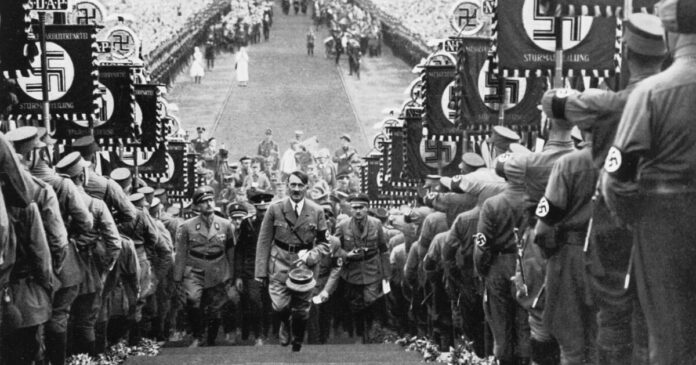
Adolf Hitler attending the Reich Harvest Thanksgiving Festival in in Buckeberg in October 1934 (Image: Universal Images Group via Getty)
It was a day when the world held its collective breath. This week, 87 years ago, PM Neville Chamberlain had just had his historic first meeting with Adolf Hitler. The question on everyone’s lips was whether it had been a futile last effort to stop an inevitable conflict, or if it really might pull Europe back from the brink of a devastating new war.
When it came to the answer, much of it would lie with the attitude of Hitler. Was he prepared to compromise on the details of how he absorbed Czechoslovakia’s Sudetenland into the Reich? Or would he insist on doing it in a way that would risk war with Britain and France? And did the Sudetenland represent the end of his territorial ambitions, or was it just the latest staging post towards his ultimate aim of European domination?
For almost everyone, this was a question shrouded in doubt. But there was one Englishman who could claim to be better informed about Hitler’s thinking than almost anyone else. Because on September 17, 1938, as the world was waiting and wondering, the journalist George Ward Price was sitting down to take tea with Hitler and his acolytes in their Eagle’s Nest hideaway in the Bavarian mountains.
Over five years, Ward Price had worked relentlessly to get to know the Nazi leadership. He realised the rise of Nazi Germany was the story of the decade, and he knew that beating his journalistic rivals depended on him getting to know those at the heart of the story. And with his smooth and debonair manner, no one was better than Ward Price at cultivating relationships with contacts. It was an effort that had already led to a series of astonishing scoops.
He got a world exclusive when Hermann Göring told him Germany had established an air force, despite not being allowed one under the Treaty of Versailles. When Germany announced the introduction of conscription into the German Army, Ward Price got an exclusive interview with Hitler about why they were doing it.
Read more: The lesser-known campaign that helped changed the course of WWII
Read more: The best five spy books since epic bestseller The Hunt For Red October

British journalist George Ward Price, right, with Hitler (Image: Ullstein Bild via Getty)
Then on the evening after Germany risked war by sending troops into the Rhineland in 1936, Ward Price managed to spend an hour alone with Hitler and Göring, talking to them about it. When Hitler gave a speech on the balcony of Linz city hall on the night of Germany’s invasion of Austria, Ward Price was standing on the balcony alongside him and then got another interview with him the next day.
Each of these had been a massive story that had established him as the pre-eminent journalist of his day. But getting an interview with Hitler during the most dangerous European crisis in a generation was a world exclusive that trumped them all. If Ward Price had any doubts about the significance of the story, they would have ended in the lift at the Eagle’s Nest carrying him, Hitler, and other leading Nazis Heinrich Himmler, Joseph Goebbels and Joachim von Ribbentrop.
As they rose, Goebbels wondered out loud what would happen if the lift got stuck. “World politics would have to stop, too,” was Hitler’s sardonic reply. At the top, Hitler led them on a tour of the building, then took them out on to the balcony, where he spoke with boyish enthusiasm about his plans to develop Berchtesgaden with new roads and a hotel, and about how the Eagle’s Nest would be the perfect place to watch a storm.
Once they had finished taking in the view, they went back inside and sat around a log fire. Ward Price was sitting between Hitler and Goebbels, and as they enjoyed tea and cake, Hitler gave his views. Mostly, he just set forth a predictable mix of lies and anti-Czech hatred, as he blamed the crisis on the Czechoslovakian government’s supposed poor treatment of the Sudetenland’s ethnic German population.
But while Hitler still maintained the pretence that he wanted peace, he made it clear that if he did not get what he wanted, he would invade, saying: “The fact I have taken measures on such a huge scale [in rearming] is the best proof of my determination to stop Czech oppression of the Sudetens.”

British PM Neville Chamberlain with Adolf Hitler in September 1938 (Image: Getty)
He also warned the only way Czechoslovakia could continue as an independent country was by giving in to his demands. “If we have to march in, they are finished,” he warned. Given Hitler’s strident tone and complete lack of any willingness to compromise, Ward Price’s article about the interview sent a chill through Europe.
When the British ambassador to Czechoslovakia visited President Edvard Beneš later that day to tell him Britain and France now thought he would have to give up the Sudetenland, Beneš pointed to Ward Price’s article. He said it was evidence that the Sudetenland would not be the end of the crisis, but just a step towards Germany’s complete domination of Czechoslovakia.
He was to be proved tragically right six months later, when Germany annexed the rest of Czechoslovakia. But it was not just Hitler’s words that Ward Price thought troubling. His voice sometimes rose to a shout as he talked, and at one point Ward Price noticed his clenched fists quivering. He later wrote that, “in that instant I felt I was not talking to a man of normal mental balance”.
Yet for all Hitler’s anger, once the interview was over, they all stood in little groups chatting amiably. Ward Price was not in Hitler’s group, but he could hear him talking to Himmler and Goebbels about why people should be vegetarian.
Eating meat was brutal, he said, and it only happened because people let their greed get the better of them. As he made his case, the Fuhrer gave an impression of a farmer’s wife petting a small pig. “Day after day, she goes on fondling it and petting it until at last the dear little pig reaches a certain weight,” he said. “And then, without the slightest compunction, a knife is stuck into its throat and it dies with a horrible squeal. And a few hours afterwards the same farmer’s wife is eating it and saying how good it tastes.”
As Ward Price listened, he was struck by how the pleasantness of the conversation contrasted with the brutality of the Nazi regime, and thought about the strange situation he found himself in.

Ward Price, right, with Chamberlain, left, and Ribbentrop following PM’s first meeting with Hitler (Image: Wikipedia)
“I had met them on many occasions before and, now as then, nothing could be more congenial than their attitude,” he wrote. “It needed a conscious effort to realise that the European War, about which we had talked so much as a possibility, would be, if it occurred, one in which they and I would be on different sides.”
And when war finally came, there was no more fervent anti-Nazi than Ward Price. He wrote many articles criticising Hitler and other leading Nazis, often in personal terms.
He even went on BBC radio to broadcast a message into Germany. Given his previous close relations with the leading Nazis, some of them felt betrayed, and German radio lashed out at him, making bizarre claims about him being forced to tell anti-German lies because of pressure from Jews.
Though strangely, it seems that Hitler himself was more understanding than others about Ward Price’s position. Goebbels recorded in his diary: “I grumble about Ward Price, who’s attacking us most viciously in the press and on the radio at the moment. The Fuhrer still comes to his defence a bit, saying he is just representing his country and so on.”
Yet for all Ward Price’s anti-Nazism once Britain was at war with Germany, for the rest of his life he would face questions about his reporting in the 1930s. Had he been a Nazi sympathiser? Or had he been so ruthlessly determined to maintain access to the Nazi leadership that he crossed the line from journalist to propagandist?
One critic, Winston Churchill, declared on meeting him: “I see that you’ve been over in Germany again, shaking the bloodstained hands of your Nazi friends.” Yet in his autobiography, Extra-Special Correspondent, published in 1957, Ward Price claimed he “reported his [Hitler’s] statements accurately, leaving British newspaper readers to form their own opinion of their worth”.
Born in 1886, the son of a clergyman, he died mostly forgotten but rich, leaving more than £125,000 in his will at a time when the average annual UK salary was £1,000.

The Fuhrer pictured at a huge rally in 1938 when Ward Price was getting to know him (Image: Getty)
In my new book, Interviewing Hitler, I set out to find the truth behind the controversy, looking at how Ward Price covered the Nazis in the 1930s for the Daily Mail. My conclusion? That he had far-Right views. And that he deliberately presented the Nazis in a positive light and left out information they would find inconvenient, as he was desperate to keep in with them.
Among the awful things he wrote in the 1930s were that “we can count upon the fact that Herr Hitler has a strong desire for peace”, and the time he assured people that “fondness for children and dogs is regarded by many as evidence of good nature [and] this is a strong trait in Hitler’s character”.
In short, for all Ward Price’s success, the price he paid for it was one that no journalist should ever pay: his independence and integrity. So while Ward Price may have been lauded for his world exclusives, we should look back on them today as a shameful episode in newspaper history.
- Interviewing Hitler: How George Ward Price Became the World’s Most Famous Journalist, by Richard Evans (History Press, £22) is out now
























































